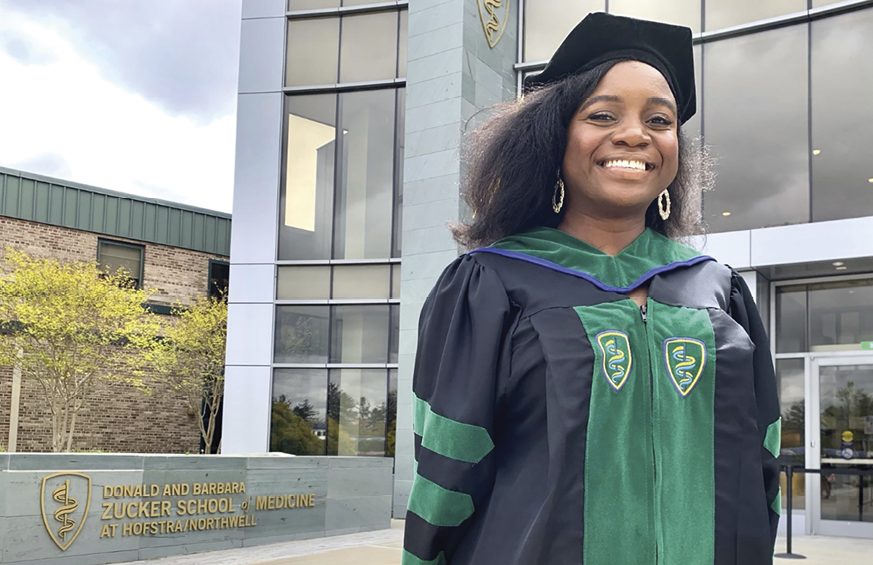- Home
- Media Kit
- MediaJet
- Current Issue
- Past Issues
- Ad Specs-Submission
- Reprints (PDF)
- Photo Specifications (PDF)
- Contact Us
- PRIVACY POLICY
- TERMS OF USE
![]()
ONLINE
![]()
ONLINE

Defining Health
Editors’ Note
Michael Dowling is one of healthcare’s most influential voices, taking a stand on societal issues such as gun violence and immigration that many health system CEOs shy away from. His leadership has been invaluable to Northwell’s consistent expansion and prominence. In March 2020, he successfully navigated the health system through the first COVID-19 epicenter in the U.S., detailing Northwell’s experiences in a book titled, Leading Through a Pandemic: The Inside Story of Humanity, Innovation, and Lessons Learned During the COVID-19 Crisis. Overall, Northwell treated over 300,000 COVID patients – more than any other U.S. health system.
Prior to becoming CEO in 2002 and joining Northwell in 1995, Dowling served in New York State government for 12 years, including seven years as State Director of Health, Education, and Human Services and Deputy Secretary to the Governor. He was also Commissioner of the State Department of Social Services. Earlier, he was a Professor of Social Policy and Assistant Dean at the Fordham University Graduate School of Social Services and Director of the Fordham campus in Westchester County. Dowling has been honored with many awards and recognitions over the years, including the Ellis Island Medal of Honor, the Presidential Distinguished Service Award for the Irish Abroad, the Alfred E. Smith Award from the American Society for Public Administration, the National Human Relations Award from the American Jewish Committee, and the Foreign Policy Association Medal Award. In 2017, he was selected to serve as the Grand Marshal of New York’s St. Patrick’s Day Parade. In 2022, he was named the most influential leader in healthcare by Modern Healthcare, ranking #1 in its annual list of the “100 Most Powerful People in Healthcare,” making it the 16th consecutive year he was featured.
Dowling is past Chair of the Healthcare Institute and the current Chair of the Institute for Healthcare Improvement (IHI). He is a member of the Institute of Medicine of the National Academies of Sciences and the North American Board of the Smurfit School of Business at University College, Dublin, Ireland. He also serves as a board member of the Long Island Association. He is past chair and a current board member of the National Center for Healthcare Leadership (NCHL), the Greater New York Hospital Association, the Healthcare Association of New York State, and the League of Voluntary Hospitals of New York. Dowling was an instructor at the Center for Continuing Professional Education at the Harvard School of Public Health. He earned his undergraduate degree from University College Cork (UCC), Ireland, and his master’s degree from Fordham University. He also has honorary doctorates from the prestigious Queen’s University Belfast, University College Dublin, Hofstra University, Dowling College, and Fordham University.
Institution Brief
Northwell Health (northwell.edu) is a clinical, academic, and research enterprise with a workforce of more than 87,000 and annual revenue of $18.0 billion. Northwell is the largest healthcare provider and private employer in New York State, caring for more than two million people annually through a vast network of more than 890 outpatient facilities, including 220 primary care practices, 52 urgent care centers, home care, rehabilitation, and end-of-life programs, and 21 hospitals. Northwell also pursues pioneering research at the Feinstein Institutes for Medical Research and a visionary approach to medical education highlighted by the Zucker School of Medicine, the Hofstra Northwell School of Nursing and Physician Assistant Studies, and one of the nation’s largest medical residency and fellowship programs.

Long Island Jewish Medical Center
What are your views on the current state of healthcare?
There is always a tendency to focus on the negative – the pessimism reflex. So, let’s be more positive to begin with. We have made extraordinary progress over the past 50 years or so. I actually wrote a book to emphasize this point. It’s title is Healthcare Reboot: Emerging Trends Energizing Healthcare. In almost all areas – pediatrics, heart disease, cancer, transplant, muscular skeletal – there has been incredible advancement. What we can do today, the lives that can be saved and/or extended, is a fabulous success story. What we can do today was unimaginable 40, 50 years ago – as a result of science, research and discovery. We are also living longer. This progress needs to be celebrated – and it is continuing. Those of us on the front lines of healthcare witness it each day.
Like all disciplines and professions, we have deficiencies that need to be solved. We have access, insurance coverage and equity issues. These require a concerted focus and leadership by all. Government of course has a major role since government reimbursement – especially the low Medicaid payment system – is a contributor to much of the inequities in healthcare delivery.
It is important to understand that most ill health is due to lifestyle, behavior and social circumstance. Housing, poverty, gun violence, limited employment opportunity, food insecurity etc. all contribute to varying degrees of ill-health. We in the care delivery side deal with the results (and too often get blamed for it) but we are not the cause. We must, however, be part of finding the solutions.
What are the keys to driving impact when it comes to the issue of equity and access to care?
You have to start with the adequacy of government reimbursement, as mentioned earlier. It is very difficult to get people or organizations to fully commit and sustain the effort when the payment does not cover the cost – when you end up in continuous financial deficit. This must be recognized and addressed.
Despite that, however, we at Northwell are partnering with community and religious leaders and developing joint projects to address many of these issues. It is part of our mission. We are working with high schools, providing mental health and nutrition services, providing educational scholarships and employment opportunities. The overall health of the community is central to what we do.

Recent medical school graduate Britney Nathan, MD,
credits her success to the Medical Scholars Pipeline Program
at the Zucker School of Medicine at Hofstra/Northwell,
which connects underrepresented minority teens to
careers in medicine
Will you discuss Northwell’s commitment to research?
Innovation, a core cultural value at Northwell, is the creative process of reimagining research, discovery and creating a better future. The Feinstein Institutes for Medical Research is at the epicenter of this effort. Its discoveries have launched a new field of bioelectronic medicine, produced new drugs and medical devices and created new treatments that have improved the lives of millions of patients worldwide. Most recently, we have developed interventions that have allowed a patient who was completely paralyzed to move his arms and have the sense of touch.
Without research and a culture of exploration and discovery, there is little progress.
Will you discuss the impact that the medical school and nursing school have made for Northwell Health?
Education has always been a core component of our mission. We are, at present, one of the largest academic teaching institutions in the country with 2,000 residents and fellows. The creation of the medical and nursing schools was a major enhancement of that focus and they have been extraordinarily impactful and successful. They have enhanced the Northwell brand, helped enormously in top-notch clinical recruitment and accelerated the culture of innovation across the organization. They are also different and unique in how they educate – in the nature of the curriculum. At the Zucker School of Medicine, for example, all students are trained as EMTs in the first nine weeks. They ride the ambulances and participate in seeing and treating patients from the very beginning (under supervision). They are not sitting in a classroom – which is customary. They learn by witnessing and experiencing the circumstances that patients and families live in. This enhances their knowledge and evolves their perspective on the true meaning of health. We broke with tradition and the status quo and as a result, I believe, we are creating better practitioners for the future.
The creation of these schools – in participation with Hofstra University – has been one of our more important initiatives. It’s been a win-win. It’s not static, however. We continue to innovate, evolve and learn. We like to lead, not just follow.
How broadly do you define the meaning of health?
I define health very broadly. Health is much more than the delivery of medical care. People’s health is impacted by lifestyle, behavior and the environment and circumstances that people live in. It’s impacted by business behaviors, government policy, etc. Gun violence is a public health issue, as is poor housing, inferior education, lack of employment opportunity, etc. We are now learning of the negative health consequences of the growing addiction to social media – the growing rates of anxiety, depression and suicide among adolescents. We have an HBO documentary coming out shortly on our efforts to prevent high school and college kids from committing suicide. It’s a new frontier – social media as a contributor to ill health.
If you desire to be a leader in healthcare, with the goal of improving health, you have a responsibility to be a catalyst in positively affecting as many of these factors as possible. We at Northwell are attempting to do this in gun violence, food insecurity, climate change, educational opportunity for high school students, and access to care in many of our most vulnerable communities.
What have been the keys to building such a strong and effective management team at Northwell?
It has evolved and improved over the years and, of course, the process of learning how to do it best continues.
We choose smart people with an optimistic attitude and a passion for making a positive difference. They must be team players who are focused not only on their own success, but on the success of all those around them. They must be able to inspire and be able to build followership. I care less about what school people went to or what grade point average they attained – there is little correlation between those and ultimate success. I focus on attitude, personality, and interrelationship skills. I often ask “what motivates you” – is it power, title, status, money, or is it making a positive difference in the community around you? If the answer to the question is the desire to make a positive difference – I have a good candidate.
Most of our leaders come from inside the organization as a result of a very comprehensive training and succession development process. We create “ladders of opportunity” and we rotate potential leadership candidates to various roles across the organization. As a result, we have a strong “farm team” whom we meet with on a regular basis. Through our Center for Learning & Innovation (CLI), we help create a culture of continuous learning and leadership development.![]()